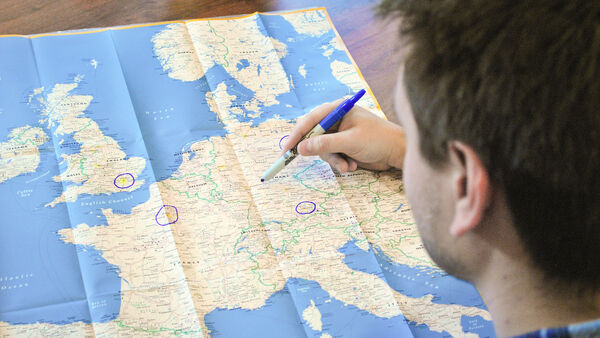Should I Get a Rail Pass?

By Rick Steves
A train traveler's biggest pretrip decision is whether to get a rail pass or stick with point-to-point tickets (or use a mix of both). Many travelers make a costly mistake by skipping over the details of this decision, as rail passes are no longer the sure bet they once were. It pays to know your options and choo-choose what's best for your trip.
Point-to-Point Tickets vs. Rail Passes
Point-to-point tickets are just that: tickets bought individually to get you from Point A to Point B. It's simplest to buy these in train stations as you travel, but they're becoming easier to purchase online (especially handy if you need to secure an advance reservation for a certain train).
By contrast, a rail pass covers train travel in one or more countries for a certain number of days (either a continuous span of days or a number of days spread over a wider window of time).
How to Know If You Need a Rail Pass
To figure out whether you want to buy a rail pass, sketch out your itinerary, then answer the following questions:
- How many days do you expect to ride the train? If you'll be on the train for just one or two days, you almost certainly won't benefit from a pass. The more time you expect to spend on the train, the more likely you'll want a pass.
- How many countries will you be visiting by train? The more countries you plan to visit, the more probable it is that you'll save money with a pass. If you're planning a whirlwind trip all around the continent, a pass (specifically, a Global Pass) is almost certainly the way to go.
No matter what, it's smart to figure out... - Roughly how much would your point-to-point tickets cost? You don't have to laboriously look up exact train fares — to get a rough idea of what you'd pay for tickets if you didn't get a rail pass, check my cost-estimate maps.
- How does your point-to-point ticket cost compare to the price of a pass? Look up the cost of a pass that covers the region you'll be in and the number of days you'll be on the train (see the country-specific pages linked in the sidebar, and see my tips for choosing among passes). Several countries, mostly in southern and eastern Europe, have train fares so low that rail passes rarely beat out point-to-point tickets. If you're sticking to moderate distances in Italy, for example, it's unlikely a pass will save you money. If you're traveling in Germany, however, a pass is likely a smart move.
Still Not Sure?
If your price comparison doesn't produce an obvious winner, take a closer look at factors that could tilt your decision one way or another, such as:
Sparse rail coverage: In some areas, such as southern Spain, coastal Croatia, much of Scotland, and all of Greece and Ireland, rail passes make little sense because trains don't reach a lot of places you're planning to go. (To learn whether your destinations are served by train, check online train schedules.)
Pricey fast-train supplements: Passes lose their luster when fees are tacked on. In some countries, passholders are required to pay extra for each trip on a high-speed train. In Italy, for instance, it costs about an additional $15 per ride for mandatory fast-train reservations on the most convenient connections between major cities. On the Eurostar train that monopolizes direct service between Paris and Brussels (and Amsterdam), passholders pay extra fees of up to $35 in second class and $45 in first class.
Advance-purchase discounts: If you don't mind forgoing some spontaneity, you'll probably be able to save money with advance-purchase discounts on point-to-point tickets. But what you save in dollars you will lose in flexibility, as these discounts are usually valid only for nonrefundable, nonchangeable reserved tickets.
Convenience: In countries or regions where reservations usually aren't required, a pass allows you to hop on and off trains without fussing with buying multiple tickets; if all other things are equal, a pass can make sense for ease of travel.

